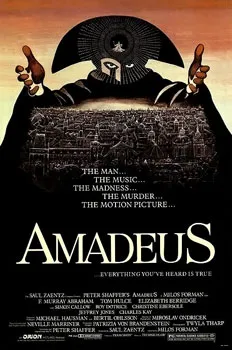Historical accuracy of Amadeus

Historical accuracy of Amadeus

Characters
Wolfgang Amadeus Mozart
Mozart's extraordinary talent is factual, but the film's portrayal of his personality as childish and vulgar is debated. While he was known for his wit and irreverence, the film exaggerates these traits.
Antonio Salieri
Salieri was a real composer, but the film's depiction of him as a jealous rival driven to destroy Mozart is largely fictionalized. There's no concrete evidence to support the claim that Salieri poisoned Mozart.
Constanze Mozart
Constanze Mozart is depicted as somewhat frivolous and naive, which may not fully reflect her true personality.
Emperor Joseph II
Emperor Joseph II was a real historical figure and patron of the arts. The film accurately depicts his role as a patron of music and his relationship with both Mozart and Salieri.
Count Franz Orsini-Rosenberg
Count Franz Orsini-Rosenberg was a real Austrian diplomat and patron of the arts. The portrayal of his character is mostly accurate, though the degree of his involvement in the alleged rivalry between Mozart and Salieri is dramatized.
Story
Mozart's genius
He is widely considered one of the greatest musical geniuses of all time.
Mozart's behavior
Mozart was known for his playful and sometimes immature behavior, but the film exaggerates these traits for dramatic effect.
Salieri's rivalry
Antonio Salieri was a composer contemporary to Mozart. While there may have been professional rivalry, the film's portrayal of intense jealousy and Salieri's supposed confession is largely fictionalized.
Mozart's financial struggles
Despite his success, Mozart faced financial difficulties throughout his life.
Mozart's Requiem
Mozart did compose a Requiem Mass, which was unfinished at the time of his death.
Salieri's role in Requiem
The film suggests Salieri commissioned the Requiem and took credit for parts of it. This is a fictional element.
Mozart's death
The cause of Mozart's death remains uncertain. The film implies Salieri may have played a role, but there is no historical evidence to support this.
Mozart's burial
Mozart was buried in a common grave, as was customary at the time. The film's depiction of a pauper's funeral is accurate, but the dramatic storm is fictionalized.
Salieri's mental decline
Salieri did experience mental health issues later in life, but the film's portrayal of his guilt and madness is exaggerated.
Music and opera scenes
The film features excerpts from Mozart's operas and other works, effectively showcasing his musical genius.
Mozart's relationship with his father
The film portrays the complex relationship between Mozart and his father, Leopold, but simplifies some aspects.
Setting
Costumes and sets
The film's costumes and sets recreate the opulent atmosphere of 18th-century Vienna.
